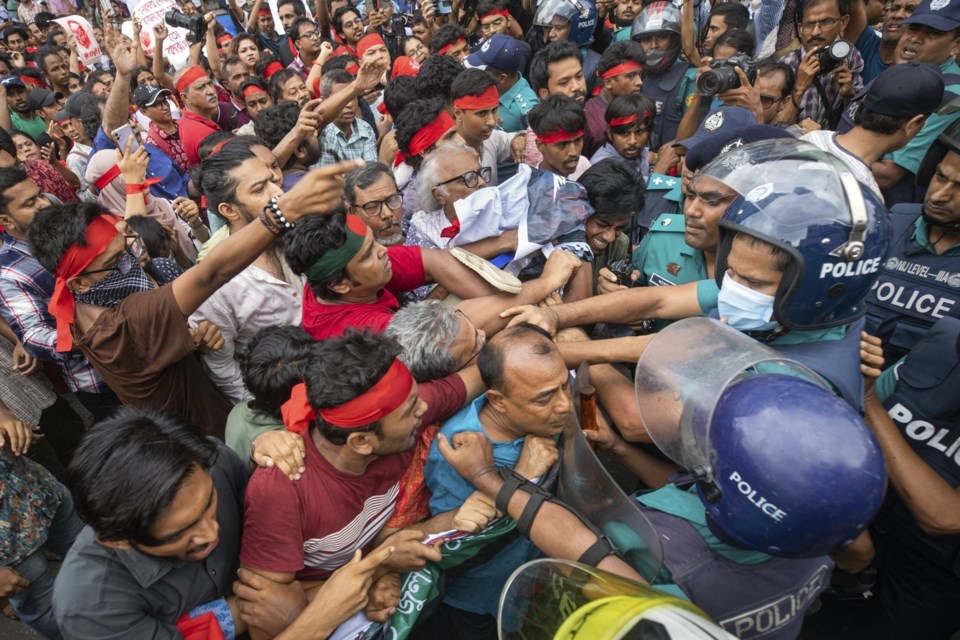DHAKA, Bangladesh (AP) — Bangladesh on Thursday banned the Jamaat-e-Islami party, its student wing and other associate bodies as “militant and terrorist" organizations as part of a nationwide crackdown following that left more than 200 people dead and thousands injured.
Bangladesh's Prime Minister Sheikh Hasina and her political partners blamed Jamaat-e-Islami, its Islami Chhatra Shibir student wing and other associate bodies for inciting violence during recent student protests over a quota system for government jobs.
In an official circular seen by The Associated Press, Bangladesh’s Ministry of Home Affairs said Thursday the ban was imposed under an anti-terrorism law.
Since July 15, at least 211 people have died and more than 10,000 people were arrested across the country.
The chief of Jamaat-e-Islami on Thursday rejected the decision in a statement, calling it anti-constitutional, and denied it was behind the recent violence.
“The government carried out massacres by party cadres and state law and order forces in the country to suppress the non-political movement of students. The country’s teachers, cultural personalities, journalists and people of different professions are protesting against this genocide of the government," said Shafiqur Rahman, the party chief.
He accused the government of seeking to cover up its own misdeeds by banning Bangladesh Jamaat-e-Islami and Bangladesh Islami Chhatrashibir.
Before the announcement on Thursday, Hasina separately told a party event that Jamaat-e-Islami and Islami Chhatra Shibir could “go underground” and carry out destructive activities after the ban. She warned that in that case they would be dealt with as militant groups.
She said that the government was set to ban the party for its involvement in the recent violence involving the quota reform movement.
Under Hasina, seen by her critics as an authoritarian, thousands of opposition leaders and activists have been arrested before last election in January when she retruned to power for fourth consecutive time. Global human rights groups have blamed her for using security forces and courts to suppress the opposition. The government has denied such allegations, saying they were arrested on specific charges. Following recent violence, more than 10,000 people including opposiiton figures have been arrested across the country.
Bangladesh Jamaat-e Islami has been banned from taking part in national elections since 2013, after the Election Commission cancelled its registration, a decision later upheld by the High Court.
The court ruled that the party's constitution violated the national constitution by opposing secularism. However, Jamaat-e Islami was not barred from conducting political activities such as holding meetings, rallies and making statements.
Ten years later, the Supreme Court in 2023 upheld the High Court decision, sealing off the long legal battle and barring the party from participating in elections or using party symbols. But again, the Supreme Court did not ban it outright.
Also in 2013, a mass uprising in the Bangladeshi capital, Dhaka, led by youth groups, civil society organizations and secular political parties called for the execution of the Jamaat party leadership for their role in 1971 war crimes.
Jamaat-e Islami was founded during British colonial rule in 1941 by a controversial Islamist scholar and campaigned against the creation of Bangladesh as an independent state during the war of independence from Pakistan in 1971.
Most of the senior leaders of the party have been hanged or jailed since 2013 after courts convicted them of crimes against humanity including killings, abductions and rapes in 1971. The party had formed militia groups to help the Pakistani military during the nine-month war against Pakistan in 1971. Bangladesh won independence on Dec. 16 in 1971 with the help of neighboring India.
Bangladesh says 3 million people died, 200,000 women were raped and nearly 1 million people fled to neighboring India during the war.
The party was banned after Bangladesh’s independence in 1971 for its role in the mass killings and atrocities under the administration of Sheikh Mujibur Rahman, Bangladesh’s founding leader and Hasina’s father. The ban was lifted in 1976, a year after Rahman was assassinated along with most of his family members in a military coup. Only Hasina and her younger sister Sheikh Rehana survived as they were touring Germany in 1975.
Jamaat had also been banned earlier twice, in 1959 and 1964 in Pakistan, for its communal role.
The party held two Cabinet portfolios under a power-sharing agreement with former Prime Minister Khaleda Zia, an arch-rival of Hasina and head of the main opposition Bangladesh Nationalist Party, in 2001-2006.
Mirza Fakhrul Islam Alamgir, secretary-general of Zia's party, on Tuesday said that the decision to ban Jamaat-e-Islami is a tactic of Hasina's administration to divert attention from the current political situation following recent violence.
Julhas Alam, The Associated Press




